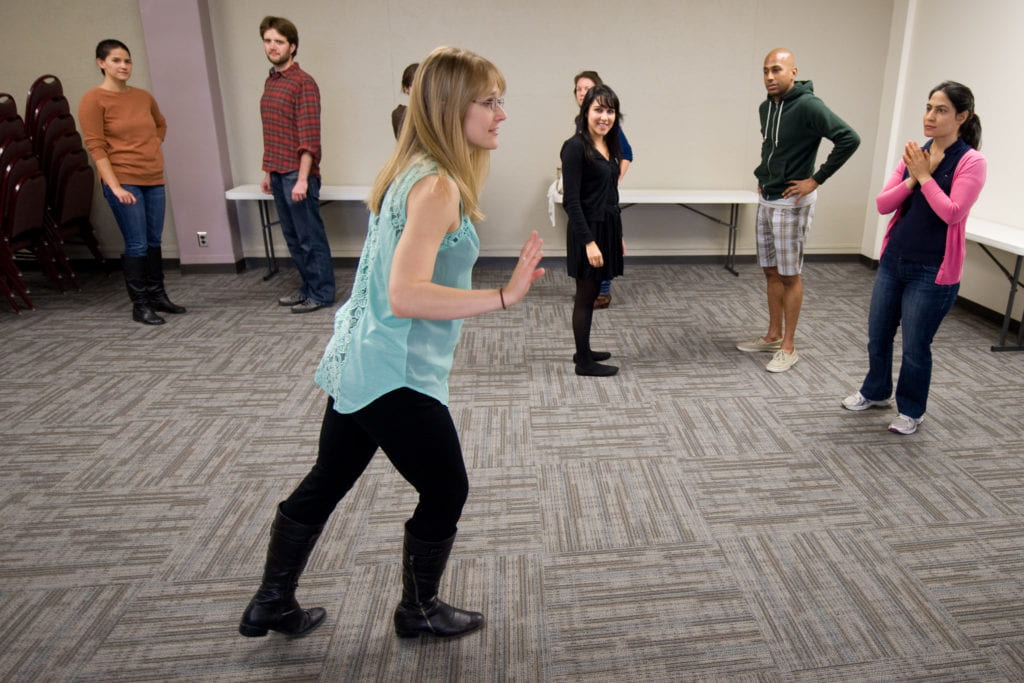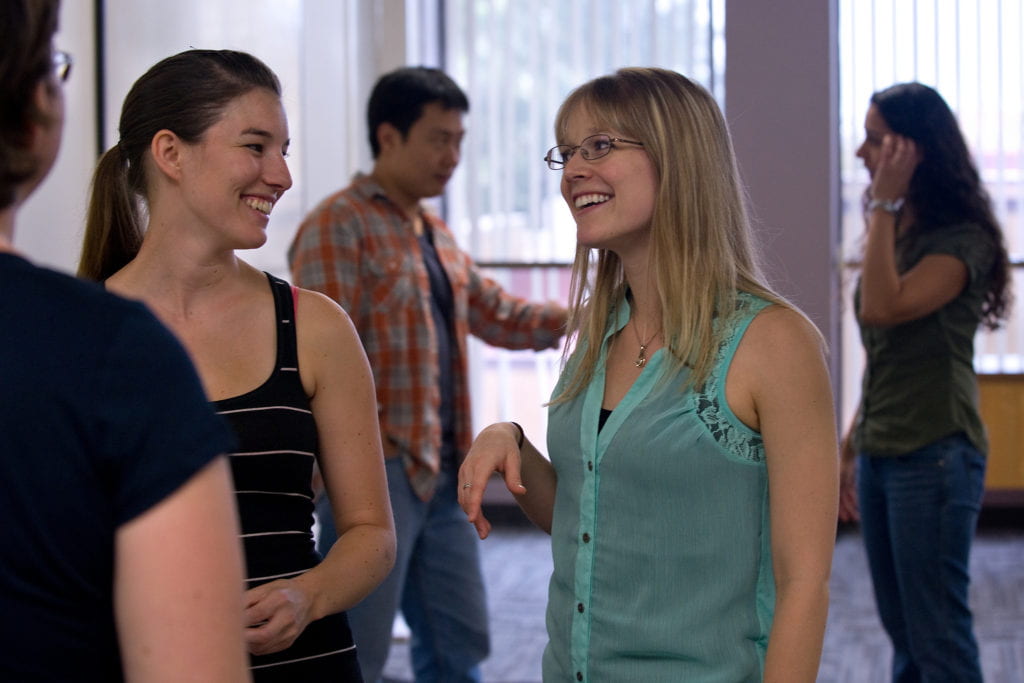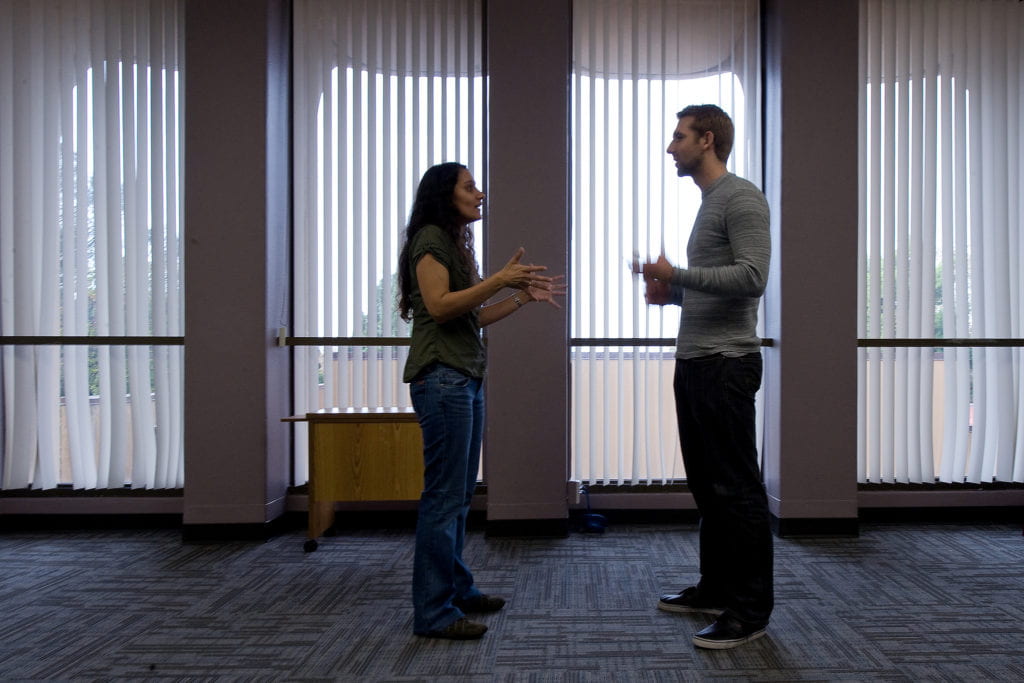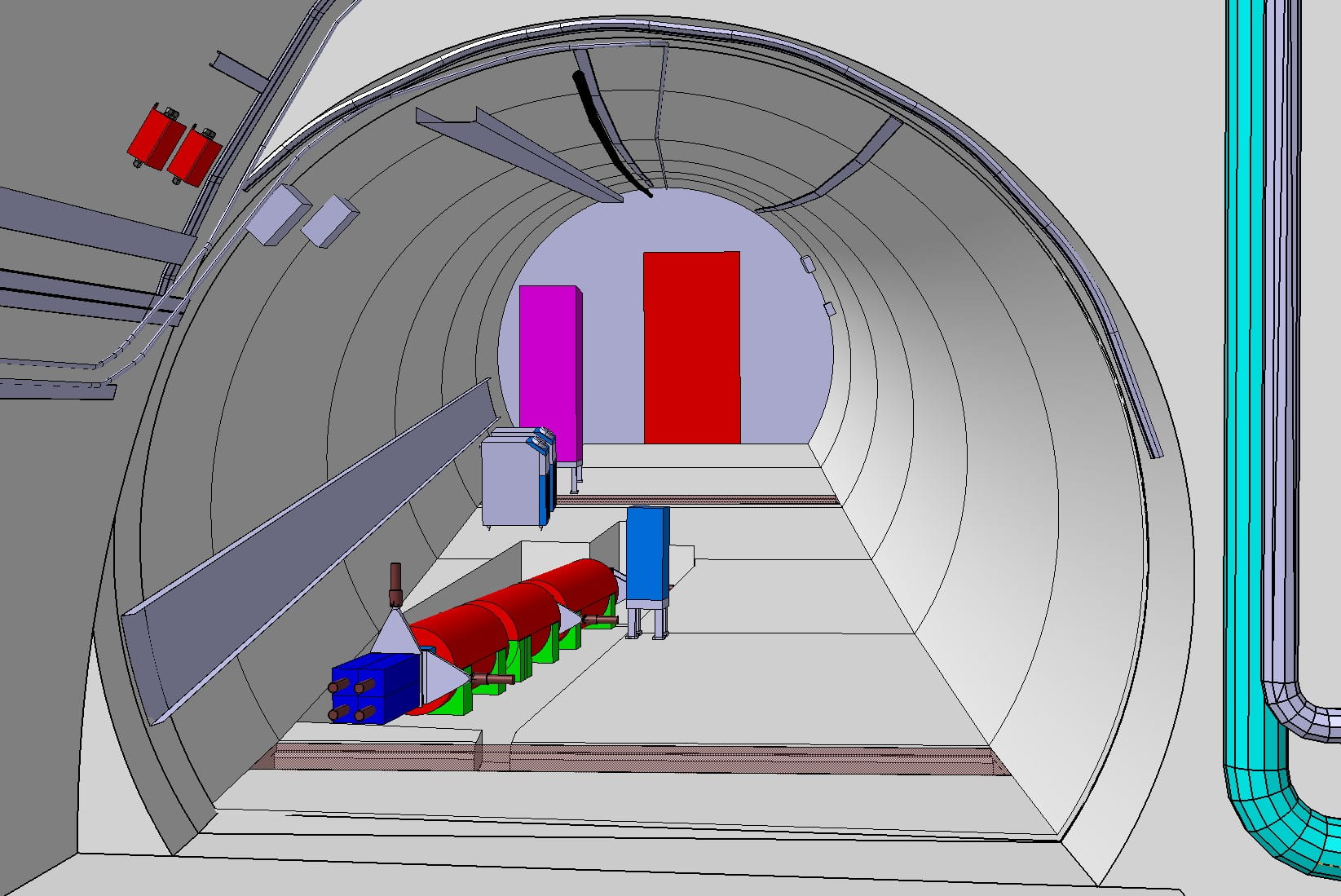Saying what’s on their minds
Graduate students learn how to overcome nerves and effectively present their research to the public
Inside UC Irvine’s Graduate Resource Center, a dozen students stand in a circle practicing a series of strange exercises. They wring their hands, bounce on their toes, pat their faces and shake their feet, all the while making “uuuuh” and “eeeeee” sounds.
Bri McWhorter, a third-year graduate student in the Claire Trevor School of the Arts’ drama department, walks among them, shouting encouragement and then: “Let’s Tarzan it out!” On cue, the participants pound their chests. “Ahh a-a-a-ahh a-a-a-ahhhhhhhh!”
What’s happening here? Is it a modern dance class? Some newfangled style of yoga? A Zumba workout gone rogue? Actually, it’s a unique communications course for graduate students who want to master the art of public speaking – or, for those who struggle with stage fright, at least make it less torturous.
“We’re training graduate students to speak using acting tools,” says McWhorter, who this month received her M.F.A. “So much of what they do is solitary research, but obtaining funding for their work is a public event. They need to communicate about their project, to get people excited about it – to make their research come alive. But if they’re nervous, all people will want is for [the presentation] to be over.”
Offered through UC Irvine’s Graduate Division, the public speaking skills course is taught by those who know how to connect with an audience, including drama professor Eli Simon, who developed the curriculum based on his Power Speech techniques for nonactors; McWhorter, who began assisting Simon with the class while pursuing her master’s in drama; and Sandra Tsing Loh, who partners with UC Irvine to produce “The Loh Down on Science” for National Public Radio and taught the winter 2014 session.
Graduate students’ “presentation goals are identical to [those of] film actors with star power. To look and sound their best, they have to hone their stage skills,” Simon says. “Great speakers can read the phone book and, by making brilliant choices, enthrall their audience. You can make people listen by holding the stage with physical and vocal expressiveness. If you’re stuck with a weak script, you can use techniques [see box] to make those lines take flight.”
Acting out their anxieties
The warm-up is essential for effective public speaking.
“You need to shake out the nerves,” McWhorter says. “Otherwise, your voice will be shaky and your body will be cowering, and that’s all [your listeners will] notice. That’s why we move around a lot and make a lot of ‘aaaaah’ and other strange sounds. We have to close the door a lot.”
In her workshops, there are no desks, nowhere to hide. She wants students to get accustomed to being in front of a group, something foreign to those who spend most of their time working alone in labs or in front of computers.
“Most of them are nervous. Public speaking is a huge fear,” she explains. “I tell them, ‘I want you to be as obnoxious as possible.’”
After warming up, participants practice one-minute introductions and short presentations before groups of three. While they talk about their research, McWhorter offers gentle critiques, occasionally pulling back hunched shoulders to make sure the students are balancing their weight solidly on both feet. She’s part acting coach, part yoga instructor: “Don’t tighten up. Chest forward. Breathe.”
“Close your eyes and imagine you are 1 foot wider and 1 foot taller than you are normally,” she tells them. “You want to have a huge presence.”
The Hawkeye connection
Frances Leslie, dean of UC Irvine’s Graduate Division, got the idea for the class in 2010 after attending a presentation by actor Alan Alda of “M.A.S.H.” fame at the Council of Graduate Schools. A frequent host of science shows on the Public Broadcasting Service, Alda discussed the need for researchers to talk about their work in a way that general audiences can appreciate.
“He said as soon as they turned on the cameras, [the scientists] couldn’t tell their story,” Leslie says. “They became like robots.”
She partnered with Simon to create the course, which has proven popular with graduate students in not only science but engineering, humanities, social sciences and other disciplines. The class can help them win grants, ace job interviews and improve their teaching skills.
“It’s important for them to present their research to the public and to policymakers in a way that’s understandable,” Leslie says. “We have a responsibility to communicate effectively.”
Interest in the class has even spread to other colleges; Leslie gave a presentation on it at a 2013 meeting of Association of American Universities graduate school deans.
Alexandra Noronha, a UC Irvine graduate student researcher in Earth system science, took the fall 2013 course because “we do a lot of climate change research, and communicating those kinds of issues to the public is critical.
“The class has been really helpful. I’ve learned how to engage people and interest them in my work. It’s given me the tools to make myself feel more comfortable and confident in front of a group.”
Participants learn how to shift attention from their own fear or self-consciousness to the emotions they’re trying to stir in the audience – concern or alarm, for example, about the consequences of unchecked global warming.
“Acting is all about the other. You don’t have time to make it about you,” McWhorter says. “Instead of worrying about what to do with your hands, you try to focus on unnerving the audience, or intriguing them, or exciting them.”
Rave reviews
The course has been so well-received that students must apply for the 20 coveted slots available each quarter; those who show genuine interest and will benefit the most are chosen, McWhorter says.
“I took this class because I wanted to be an effective and persuasive speaker,” says Allen Kim, who’s pursuing a doctorate in sociology. “It’s enabled me to make a connection with a listener. I’ve improved my stance and my emotional variations in my speech patterns. I’m using pitch and pauses to my benefit. I’m expanding my range as a communicator.”
He says he’ll be able to apply these new skills to teaching.
“As academics, we’re so into reading and writing. The drama department makes you recognize that teaching is a performance, and not mastering it makes you an ineffective teacher,” Kim says.
Students are videotaped before and after the course so that they can see the progress they’ve made. The results can be dramatic.
“They go from being very dry to much more personable,” Leslie says. “Some of them have told us, ‘I thought I knew how to communicate well, but I didn’t.’ We get them out from behind the podium.”
A few star graduates are trained to teach two-hour workshops to fellow students in their departments. Simon and his assistants also lead an intensive four-day, two-hour workshop series that covers the basics of the course.
For McWhorter, seeing students morph into calm, confident speakers has been so satisfying that she’s launched her own company, Activate to Captivate, for anyone who wants to strengthen his or her communication skills.
“I feel like I’m really helping people by giving them the power to be themselves in public,” she says.



